Malawi communities mitigate flooding through catchment-level management activities
08 June 2023
Project Name
Enhancing the Resilience of Agro-ecological Systems Project (ERASP)
GEF Implementing Agency
IFAD
Objective
To enhance the provision of ecosystem services and improve the productivity and resilience of smallholder agricultural systems through addressing land degradation, loss of agro-biodiversity, and climate change adaptation and mitigation.
Project Targets
land under integrated and sustainable management
GHG emissions avoided or reduced
beneficiary households
In Malawi, the economy is driven by the agriculture sector, made up primarily of smallholder farmers. Agriculture is the main source of employment for the nation, employing roughly 80% of the total workforce.
Despite the primary role that agriculture plays in contributing to household livelihoods and food security, the sector faces a number of challenges that limit production and threaten sustainability of the sector. Population growth, with an increasing demand for biomass for rural energy and agricultural expansion for food production, has contributed to increasing levels of land degradation and deforestation, which further limits agricultural production.
Malawi is particularly vulnerable to a number of climatic hazards; the most concerning being floods, droughts and dry spells, strong winds, hailstorms, pest infestations and disease epidemics.
Together with IFAD and Resilient Food Systems programme, the Government of Malawi is implementing ERASP, which builds primarily on the Programme for Rural Irrigation Development (PRIDE) and links with another IFAD-funded intervention, the Sustainable Agriculture Production Programme (SAPP).
ERASP promotes interventions in three districts, covering an estimated 35,000 hectares and involving 25,680 farmers. The approach focuses on a comprehensive landscape planning process for the sub-catchments, adding an agroecological approach to improving food security, and raising agricultural yields on rain-fed farming systems through climate-smart and conservation agriculture techniques.
The project is structured around three principal components:
Sustainability of the project is generated through a strong incentive framework, a high level of technical support, and cross-cutting aspects related to value chains, capacity building, knowledge management, and monitoring and reporting.
The project aims to meet the following targets:
Multi-stakeholder institutional framework established for integrated catchment area management.
Catchment-level SLM practices scaled up.
Monitoring and assessment of ecosystem services, resilience and food security established.
The project engages the following national-level departments and ministries: Ministry of Agriculture, Irrigation and Water Development; Department of Climate Change and Meteorological Services; Ministry of Natural Resources, Energy and Mining, which houses the Environmental Affairs Department; Ministry of Finance; Department of Land Resources and Conservation; Department of Forestry; Department of Fisheries; Department of Animal Health and Livestock; Department of Agricultural Extension Services; and Department of Disaster Risk Management. Other stakeholders include local universities, CSOs, and local-level authorities in the target areas. The total number of beneficiaries engaged directly by the project are 15,793 male and 16,381 female farmers.
Each RFS country project conducts activities that fall under common thematic areas within the programme. Explore each project theme relevant to the RFS Malawi country project below to see which activities are being implemented under each theme.
Stories from the Field
Explore our stories from the field to learn more about the activities, milestones, lessons learned, and achievements of the RFS Malawi project.
Relevant Resources
We have a growing library of reports, briefs, case studies, media, tools and guidelines. Explore all resources related to the RFS Malawi project to get greater insight into our programme activities.
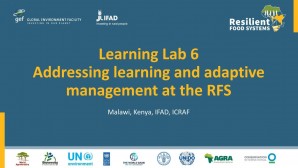
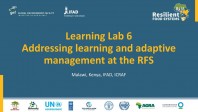
Adaptive management has been central to the RFS integrated approach. Case studies from Kenya and Malawi showcase experiences and lessons learned.
This presentation was part of Learning Lab 6: Addressing learning and adaptive management at the RFS of the 2022 Resilient Food Systems Annual Workshop in Blantyre, Malawi.
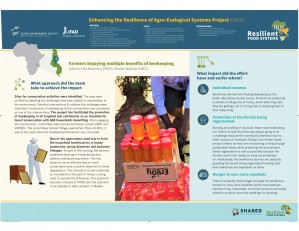
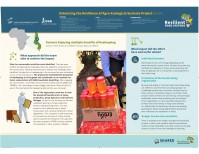
The 2022 Resilient Food Systems Knowledge Exchange and Learning Workshop included an interactive experience-sharing wall, featuring impact posters across RFS countries and components of the Regional Hub.
This poster was prepared by the Enhancing the Resilience of Agro-Ecological Systems Project (ERASP) project in Malawi.
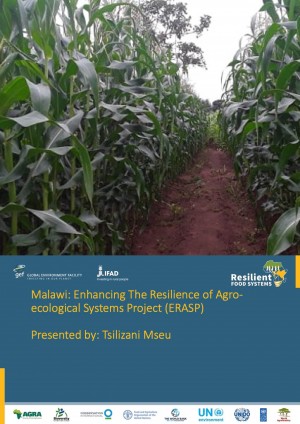
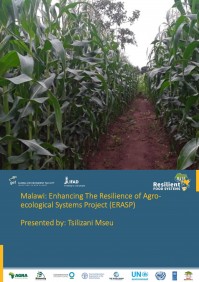
The RFS Malawi project is enhancing the provision of ecosystem services and improving the productivity and resilience of smallholder agricultural systems. During the 2021 country roundtable, Environmental Monitoring Officer Tsilizani Mseu provided an update on the project’s activities, achievements, challenges and lessons learned. The presentation was followed by facilitated Q&A session to allow country project and RFS partners a chance to exchange information and learn more about RFS activities in Malawi.